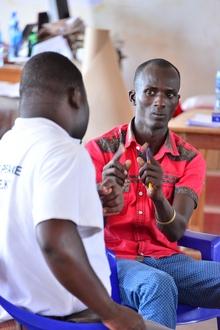Context
As a result of violent conflicts in South Sudan, Somalia and other countries of the region, the number of refugees in Kenya has now risen to approximately half a million. The refugees are not permitted to pursue employment or agricultural activities outside the refugee camps. As such, they have developed little self-sufficiency or capacity for reintegration back in their home countries.
As a result of the continued influx of refugees especially from South Sudan into the region in June 2015, the Kenyan Government allocated space for a new refugee settlement, 40 km from the town of Kakuma in a nearby location, called Kalobeyei.
The local population in the two main host areas Kakuma and Dadaab is very poor. Due to food shortages, insufficient basic services and uneven income opportunities, the living conditions are insecure, both for the refugees and for the local people. As a result, conflicts are common.
Together with partners, the Government of Kenya developed the Kalobeyei Integrated Social and Economic Development Programme in line with the provisions of the County Integrated Development Plan 2018-2022. This programme promotes self-reliance of the refugees and host communities by enhancing livelihood opportunities and by reducing dependence on humanitarian aid and support. This is in line with the Comprehensive Refugee Response Framework to which the country subscribes.
Objective
Living conditions have improved for refugees as well as for the local people of Turkana West (Kakuma) and Garissa County (Dadaab).


